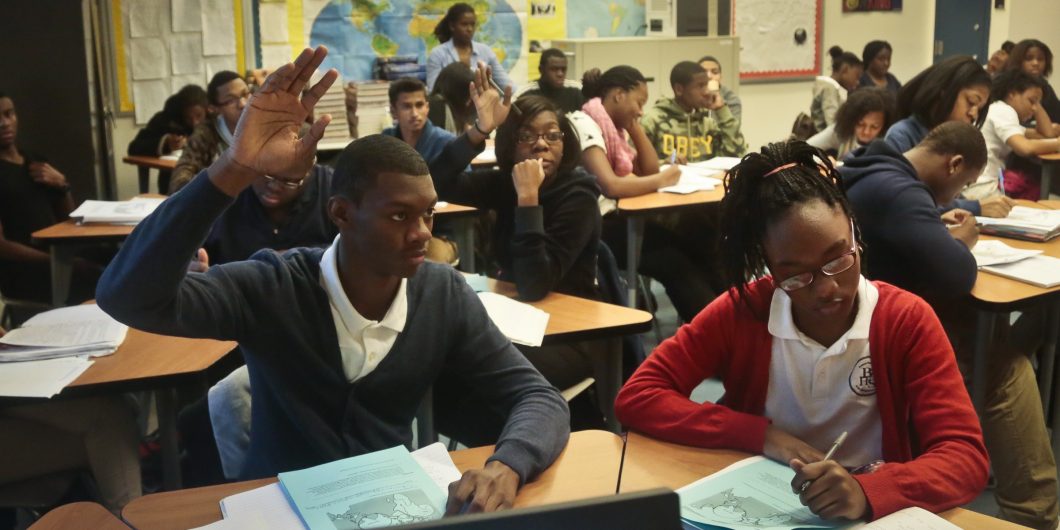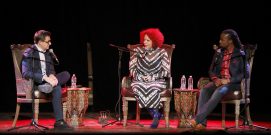The ideals instilled by American higher education today are poised to have a profound influence on countries around the world tomorrow.
Infantilizing Minority Students
Remember Ebonics? It was a term invented some 55 years ago to describe the variant of English often used by black Americans when speaking among themselves. It made headlines in 1996 when the Oakland, CA school board adopted a resolution aimed at improving the scholastic performance of African Americans by treating Ebonics as a distinct language, using it as a tool to improve their acquisition of standard English, just as in other forms of bilingual education. Although the board never intended that teachers conduct instruction in Ebonics, the resolution (as described by African American linguist John McWhorter in his book Losing the Race) soon became enmeshed in racial controversy, between critics who misrepresented the resolution’s intent and defenders, some of them advocates of black separatism, who accused the critics of racism.
The Ebonics controversy is now passé. Instead, the cutting edge in education theory is led by a scholar who argues that grading students on the basis of the quality of their work, rather than their perceived “effort” or the sheer quantity of their submissions, is inherently racist and a major contributor to inferior academic performance by black students. The leading proponent of this position is Asao Inoue, Professor and Associate Dean of Academic Affairs, Equity, and Inclusion for the College of Integrative Sciences and Arts at Arizona State University. He is the 2019 Chair of the Conference on College Composition and Communication, a past member of the CCCC Executive Committee, and the Executive Board of the Council of Writing Program Administrators. The CCCC has itself awarded Inoue two “Outstanding Book” awards for publications over the past half-dozen years.
As is to be expected of a scholar of such repute, Professor Inoue supplements his base salary and royalties by periodically making the rounds of the college lecture circuit. On January 21 Inoue offered a Zoom lecture, sponsored by several departments at the College of the Holy Cross (where I teach), and attended by a sizable number of faculty and administrators from Holy Cross and other academic institutions, devoted to explaining how to use what he calls “Labor-Based Grading Contracts for Socially Just Teaching.”
Inoue began his presentation by calling for the audience to engage in a ten-minute pause to engage in “mindfulness” (an unusual step for a lecturer, for sure). He then offered a talk, the character of which can be illustrated by some of the PowerPoint slides on which he relied. Following an initial slide that carried the simple legend “Short Argument about White Language Supremacy and Standards for Grading,” the next one offered a unidirectional flow chart (under the heading “Language Travels with People”), illustrated by balloons reading (from left to right) “Language,” “People,” “Language Standards,” “Good Writing,” (the latter phrase in scare quotes), and “White Supremacy.” I’ll cite just one more here: “Bottom Line: in courses that use and teach writing, if you use a single standard to grade student writing, then you reproduce white language supremacy.” (Inoue, it might be noted here, is not himself black—his parents were of Japanese and European ancestry—but he considers himself a sort of honorary black person, since as a young child he lived in a poor black neighborhood.)
As readers may infer from these slides, Inoue’s talk was not pitched at an intellectually high level. (Or, at least, subtlety isn’t one of his strengths.) However, it was received with great warmth by his audience. While some asked for clarification about how to apply his recommendations for assessing student work, and even expressed a bit of skepticism about their feasibility, only one professor forthrightly challenged his claims about the inherently racist character of quality-based grading. It is alarming to think that the academics in his audience, at Holy Cross and elswewhere, will actually endeavor to apply his methods for combating alleged white supremacy in their classes. As Inoue explains in his award-winning book (that is, it won an award from an organization on whose board he had served), Antiracist Writing Assessment Ecologies: Teaching and Writing for a Socially Just Future, he replaces judgments of quality in his classes with such devices as creating “project rubrics” with his students and having the students sign “labor contracts” according to which they will be judged by the quantity of work that they submit.
Instead of endeavoring to inspire his minority students with the hope that, whatever their economic or familial background, they can indeed learn to write well, Inoue encourages them to blame the difficulty or pain they experience on other people’s racism.
Something of the character of Inoue’s own writing may be gleaned from the following, somewhat randomly chosen sentence: “Thus the project rubric was a place of norming to a locally generated SEAE [Standard Edited American English] and a white racial habitus represented in the articles students used to induce writing dimensions.” I counted four instances of lack of subject-verb number agreement in just the first paragraph of the Appendix to the “Grading Contract” Inoue issued to a writing class that he includes in Antiracist Writing Assessment Ecologies. In this regard, Inoue is a man who practices what he preaches.
Additionally, taking account of what he calls the “physical pain or discomfort” that hard labors often cause, as expressed by what he calls two of his students’ “’oh shit’ moments,” Inoue (reporting on an intensive writing course he offered at Fresno State University) sought “to acknowledge the sensual and emotional aspects of the labors of reading, writing, and receiving assessments of their work.” He is mindful of this not in order “to change students’ minds about how they feel about the labor, but to acknowledge and potentially explore those feelings that accompany any labor, . . . and perhaps allow those feelings to be some initial indication of productive labor,” especially considering “that most students have such experiences with writing, reading, and assessment in school because of unreflective, hegemonic, and often racist, writing assessments that those labors usually exist in.”
It would appear from these remarks that Inoue’s customary manner with his students is no less patronizing than the one he displayed towards his academic audience on January 21. But what is most deeply troubling is that even as Inoue accuses other pedagogues of racism, it is really his own association of standards of good writing with “white supremacy” that is truly racist. Instead of endeavoring to inspire his minority students with the hope that, whatever their economic or familial background, they can indeed learn to write well—paving the way to success in business, law, teaching, or politics—he encourages them to blame the difficulty or pain they experience on other people’s racism.
How would he explain the rhetorical heights achieved by Frederick Douglass, born to a far worse condition than any of Inoue’s students, yet—as a consequence of hard work—achieving such command of the English language as an Abolitionist orator and essayist that some audiences wrongly supposed he must have been relying on a ghostwriter? What of the eloquence of such other black leaders as Booker T. Washington, who like Douglass, was born into slavery, managed to procure an education at the Hampton Institute, and went on to found the justly renowned Tuskegee Institute, as recounted in his book Up from Slavery; W.E.B. DuBois, who earned a doctorate in Germany, the home of another Eurocentric language, and went on to found the NAACP; and Martin Luther King, Jr., who inspired so many whites as well as blacks to support the civil rights movement? Does Inoue think that Justices Thurgood Marshall and Clarence Thomas owed their command of the language of the law to privileged upbringings? What of the rhetorical feats of many other black ministers of both the present and the past, especially in the South? To these men, the command of standard English, far from a tool of “white supremacy,” was an instrument of black liberation. Yet Inoue encourages his students to dismiss or at least disregard such achievements.
The causes of widespread black and Latino underachievement in today’s schools are several but hardly obscure: high rates of single motherhood (a problem first brought to public notice in Daniel Patrick Moynihan’s 1965 report on “The Negro Family”); unmotivated public school teachers who are guaranteed tenure for life; judicial restrictions on the capacity of school administrators to suspend disruptive students, who make it impossible for their classmates to learn; the failure of government to support proven alternatives to the regular public schools in the form of charter schools or vouchers to finance attendance at private and parochial schools; and the gang “culture” amid which so many poor youth grow up. But to blame educational underachievement on white supremacy is an act of pure demagoguery.
Inoue presents himself as a kind of liberator, removing barriers to black students’ academic success. But such a label is an insult to generations of eloquent black leaders—and to any educator who encourages the pursuit of excellence by students of all races.



